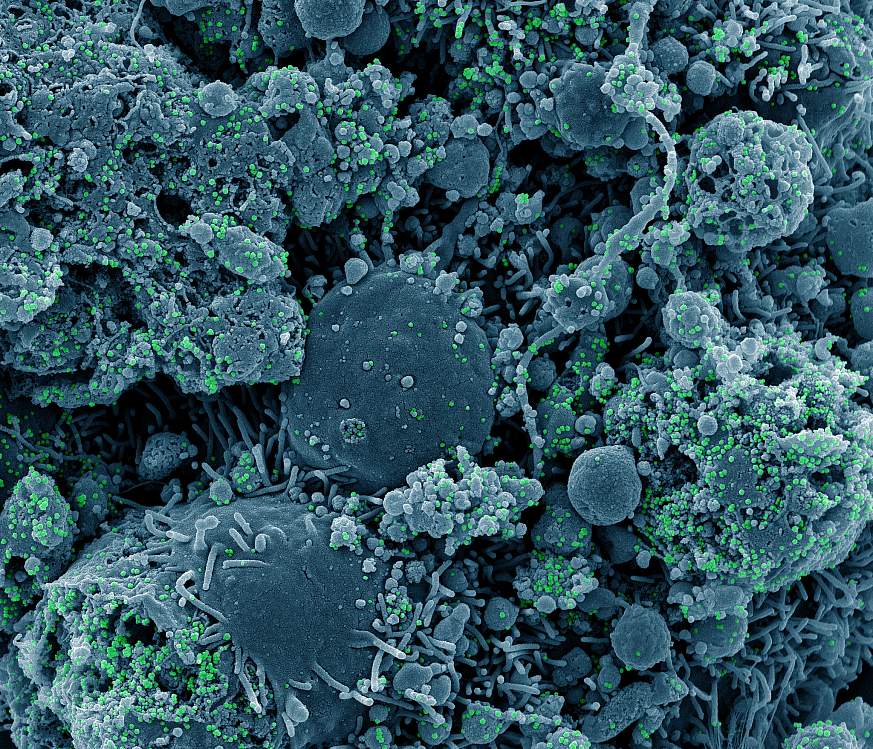You are here
News Release
Wednesday, March 9, 2022
NIH launches trial to study allergic reactions to COVID-19 mRNA vaccine

Researchers from the National Institute of Allergy and Infectious Diseases (NIAID) are conducting a clinical trial designed to help understand rare but potentially serious systemic allergic reactions to COVID-19 mRNA vaccines. The single-site trial will enroll up to 100 people aged 16 to 69 years old who had an allergic reaction to a first dose of COVID-19 mRNA vaccines. Study participants will receive a second dose of vaccine as inpatients under carefully controlled conditions at the National Institutes of Health’s Clinical Center in Bethesda, Maryland.
“People who experienced an allergic reaction after receiving a COVID-19 mRNA vaccine may be hesitant to complete their vaccine regimen,” said Anthony S. Fauci, M.D., NIAID Director. “This study will help us determine if individuals who experienced moderate systemic allergic reactions can safely receive a second dose of a COVID-19 mRNA vaccine.”
The trial is seeking participants who experienced a mild or moderate systemic allergic reaction following a first dose of either the Pfizer-BioNTech or the Moderna COVID-19 mRNA vaccine. However, people who developed severe allergic reactions to a first dose of a COVID-19 mRNA vaccine are not eligible to enroll. Pamela A. Guerrerio, M.D., Ph.D., of NIAID’s Laboratory of Allergic Diseases, leads the trial.
“Overall, severe allergic reactions to COVID-19 mRNA vaccines, including life-threatening anaphylaxis reactions such as low blood pressure and difficulty breathing, are rare, on the order of five cases per million vaccine doses administered,” noted Dr. Guerrerio. “Our study aims to provide a better understanding of the mechanisms responsible for systemic allergic reactions such as hives, swelling, trouble breathing and light-headedness or passing out.”
To maximize safety, all participants will be admitted for a minimum of four days to the Intensive Care Unit at the NIH Clinical Center, where experienced medical staff, as well as equipment and medications needed to treat severe allergic reactions, are readily available. On consecutive days, each participant will be randomly assigned to receive either the FDA-approved Pfizer COVID-19 mRNA vaccine, Comirnaty, or a look-alike dose of inactive placebo. All participants will thus receive the vaccine on one of the two days and can expect to be fully vaccinated by the end of their ICU admission.
At admission and during the inpatient stay, participants will have breathing tests and frequent blood draws, which will be used by medical staff to discern details of any allergic or other responses to the vaccine. The enrollees will also complete mental health/anxiety questionnaires prior to, at the time of, and in the months following vaccination. In addition to a follow-up interview by phone one week after discharge, participants will also be asked to return to the NIH for an in-person follow-up one month and again five months after vaccination. At the five-month visit, all participants who tolerated the second dose of the vaccine with no or only mild symptoms will be offered a booster vaccination with the Comirnaty COVID-19 vaccine.
Additional information about the trial is available at ClinicalTrials.gov using the identifier NCT04977479.
NIAID is also supporting an ongoing multi-site trial that aims to determine whether people who are highly allergic or have a mast cell disorder are at increased risk for an immediate, systemic allergic reaction to the Moderna or Pfizer-BioNTech COVID-19 vaccines.
NIAID conducts and supports research—at NIH, throughout the United States, and worldwide—to study the causes of infectious and immune-mediated diseases, and to develop better means of preventing, diagnosing and treating these illnesses. News releases, fact sheets and other NIAID-related materials are available on the NIAID website.
About the National Institutes of Health (NIH): NIH, the nation's medical research agency, includes 27 Institutes and Centers and is a component of the U.S. Department of Health and Human Services. NIH is the primary federal agency conducting and supporting basic, clinical, and translational medical research, and is investigating the causes, treatments, and cures for both common and rare diseases. For more information about NIH and its programs, visit www.nih.gov.
NIH…Turning Discovery Into Health®
